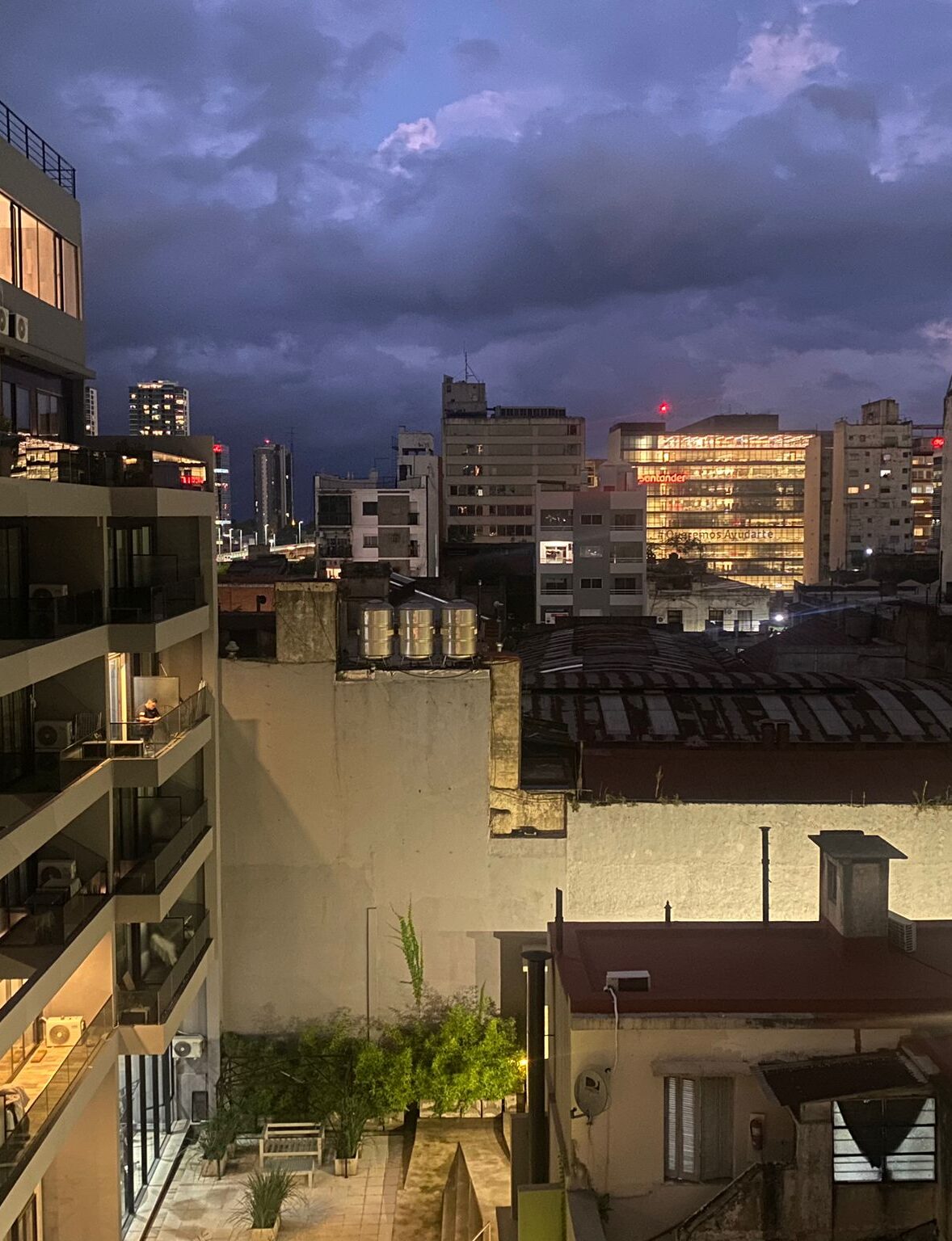
Soaked students trudge with their arms wrapped around one another, some toward their apartments to scrub the liquefied tear gas from their clothes, some to the nearby bars to wash away the stains they’ve gained on their souls. I am holding my weapon tight in both of my hands.
The wet warning shots have had the desired effect, dispersing a crowd that gathered in front of the Teatro Universidad de Chile to protest for the third time in as many days. A graying caribinero whistles low, and one of the stray puppers that roam the sidewalks of the Alameda runs up to nibble at some chorizo the green-clad cop produces from the pocket of his vest. I check my firing mechanism and center the old man in my crosshair. I can’t get a good shot; civilians in the way.
*
When the water cannons first discharged, I ran to my room to grab the machine I would use to fight back, checking the clarity of its sensor and the responsiveness of its trigger before stuffing it in my American-flagged tactical bag and flashing back into the street.
“Someone’s going back, aren’t they?” my professor asked. She stood at the corner with a few of my fellow students, flashing sirens bursting through her cloudy shock of hair in alternating horns and halos. I told her that if I wasn’t in class tomorrow to check the local jail and kept walking. The sweet, slinking stink of fresh street sopaipillas and dog shit kept my eyes glued to the ground.
My new friend Paola, a native, said Chilean social security is what brought people out into the streets. She told me the fund was breaking from people living too long, and that the jovenes didn’t want to pay anymore.
“I am much older than the other people in my class,” she said. “They hold everything in here.” she thumped her collarbones, her fists crossed at her wrists. She is twenty-three.
“My students are the same,” I said. “They will put anything on the internet, though.”
“Every post on social things is like a prayer,” she responded, putting her hands together and bowing her head.
“A prayer?”
“Yes, and the ‘likes’ they get are ‘amens.’”
She was describing her psychology thesis, how it used a book called Democracia y Immunitaria to examine a person’s right to be pain free. She would perform it by wrapping herself in cellophane so that she did not touch anything. She said cellphones made people gods, because they could choose their realities with their fingertips. Memory is no different, digital or otherwise.
Earlier that day, another Chilean artist named Ana María informed my class that she sought to cross textual thresholds by diagramming the pain of archival memory geometrically, scrunching up her face and playing a smiling breakdown on air guitar. Afterward, a few others and I went to dinner at a restaurant across the street. We packed ourselves into the entrance alcove and stopped cold at the closed door.
“Just push it in, love,” a woman said from behind us. Her accent was thick as thieves with the sarcasm of Sydney. She asked where we were from; what were we doing in Santiago?
“Mostly Florida,” someone said. “We’re students.”
I told her we had just come from a performance and she asked me who we saw. I said Ana María Briede.
“Ana María fuckin’ Briede?!” she asked.
“Yes?”
“I went to art school with her twenty years ago!”
We walked back across the street to see if Ana was still there. She was, and I left them to their smiles and laughter convinced that a small world can be a good thing.
*
There is a whimper nearby, and I drop my scope back down to my chest to see a jet-black doggo in a flannel jacket looking up at me, its tail lolling solemn. I reach to scratch it behind the ear and see that one of its eyes is empty. It realizes I have no food, trotting off without judgement. I’ve been told that taking care of the strays without claiming ownership of them is a “cultural thing” unique to this country. Paola tells me Santiago is a rude city, which is not unique at all.
The cannons have been closed, and the carabineros disperse into armored vehicles as well-abused as American riot control equipment isn’t. I tap my trigger, waiting. There is a heavy hand on my shoulder, and a sturdy voice rolls racing Spanish over my overlarge ears. I turn to see two policemen staring down at me.
“Que?” I manage weakly.
“Tú eres un corresponsal?” one asks. My face must be blank enough for him to know I don’t understand. He points to my camera.
“Oh . . . No?” I say. They look at each other and ask me to take their picture anyway, my original inquisitor handing me a cellphone from his pocket. I oblige, handing back the phone, remembering what Paola said when I messaged her to apologize for knowing so little Spanish after navigating her barrio late last night. I could have left much earlier, when it was still safe out, but we were determined to bang our heads against our false friends, the walls of our mother tongues, until what we wanted got through. Paola said it best:
“Language is never a problem when one person wants to exist in another.”
Jared Alan Smith is a public educator from Central Florida and one of the founding editors of the Stetson University literary magazine Obra / Artifact. His work can be found in Hinchas de Poesia, Burrow Press’ Fantastic Floridas, and elsewhere.
Photo by author.




